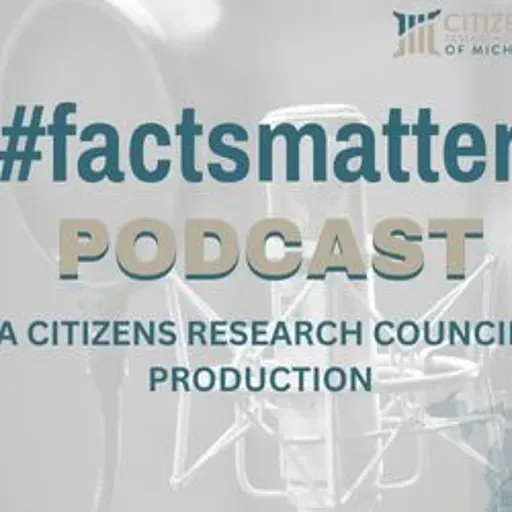
27 August 2025
No More Free Lunch for All: Lack of State Budget Already Impacting Some Schools – and Kids
#FactsMatter, the Citizens Research Council of Michigan podcast
About
#FactsMatter host Guy Gordon chats with Craig Thiel, Research Director for the Citizens Research Council, who first wrote about the impact of state budget uncertainty on Michigan’s $200 million School Meals program back in June –before passage of the federal One Big Beautiful Bill Act (OBBBA). Michigan’s two-year-old School Meals program guaranteed universal access to free school breakfast and lunch to all K-12 students across the state, regardless of their income status.
The continued lack of certainty about Michigan’s K-12 budget, due to its not being passed, has already prompted at least one notable district, Okemos, to discontinue its universal school meals program, effective the first day of school. Funding for the state School Meals program, established in response to student food insecurity concerns following the COVID-19 pandemic, has been in place for the last two years. Current funding will end on September 30.
The budget passed by the Michigan House does not include dedicated funding for the universal school meals program. The Governor’s proposed budget and the Senate budget do.
The income-based federal free breakfast and lunch program will continue. However, with the federal government imposing major changes to SNAP and Medicaid through OBBBA, eligibility can change. Thiel explained:
“Right now, no one knows the specific numbers of impact, either nationally or in Michigan, but we do know the general direction: people will be losing access to Medicaid and access to SNAP. And those programs are used in Michigan schools to help identify students for free meals.”
The majority of the $200 million from Michigan’s budget covered the difference between what the federal government covers and the cost of feeding all children. For students, it also removed any stigma associated with the federal income-based food breakfast and lunch program.
Thiel stated that approximately 150,000 to 200,000 additional students participated in Michigan’s School Meals program in 2024-25, compared to 2022-23, according to Department of Education data.
“About 10 to 15 percent of K-12 students would lose access to these free meals.”
The continued lack of certainty about Michigan’s K-12 budget, due to its not being passed, has already prompted at least one notable district, Okemos, to discontinue its universal school meals program, effective the first day of school. Funding for the state School Meals program, established in response to student food insecurity concerns following the COVID-19 pandemic, has been in place for the last two years. Current funding will end on September 30.
The budget passed by the Michigan House does not include dedicated funding for the universal school meals program. The Governor’s proposed budget and the Senate budget do.
The income-based federal free breakfast and lunch program will continue. However, with the federal government imposing major changes to SNAP and Medicaid through OBBBA, eligibility can change. Thiel explained:
“Right now, no one knows the specific numbers of impact, either nationally or in Michigan, but we do know the general direction: people will be losing access to Medicaid and access to SNAP. And those programs are used in Michigan schools to help identify students for free meals.”
The majority of the $200 million from Michigan’s budget covered the difference between what the federal government covers and the cost of feeding all children. For students, it also removed any stigma associated with the federal income-based food breakfast and lunch program.
Thiel stated that approximately 150,000 to 200,000 additional students participated in Michigan’s School Meals program in 2024-25, compared to 2022-23, according to Department of Education data.
“About 10 to 15 percent of K-12 students would lose access to these free meals.”